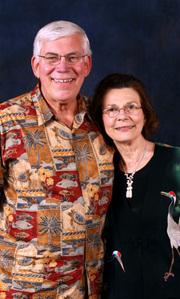Sharing a love of marine life

When Enid Rusev began volunteering at Long Marine Lab in 1981, the aquarium was housed in a shed across the road from a Brussels sprout field. However, she and her husband, John, saw great potential in this small research and educational facility.
Inspired by the vision of Bill Doyle, founding director of UCSC’s Institute of Marine Sciences, they have helped to fulfill his dream for the past 31 years. Volunteering and donating to this unique education and research center, located on a coastal bluff overlooking the Monterey Bay, has been one of the most satisfying experiences of their lives.
John Rusev described Long Marine Lab as “an almost one-of-a-kind marine research laboratory in California.” The working lab opens its doors to visitors, who may take tours of the facility starting at the Seymour Marine Discovery Center next door.
These days, more than 200 volunteers keep the center running, but Enid Rusev can look back to the early, bare-bones days when she and a handful of volunteers met upstairs in a classroom.
“There were lots of trailers, and we had our blue whale,” she said, referring to the now-famous whale skeleton that greets visitors in front of the Seymour Marine Discovery Center.
Over the years, the lab has grown in size and reputation. In the early days, it could house only a small sample of sea life. Now it is home to a wide range of marine life native to Monterey Bay, from predatory birds to elephant seals. Today, the lab is known worldwide for research and educational opportunities.
While serving on the board in the mid ’80s and early ’90s, John Rusev helped secure a donation of more than $80,000 for the Seymour Center. The funds were an open gift for the marine sciences program. He returned to the board five years ago and is currently an active member.
One of the greatest gifts for the couple has been being able to share their interest with another generation.
“If you can take a young mind and give them a chance to explore and learn about the ocean, it can be so important in their understanding of the world around them,” Enid Rusev said.